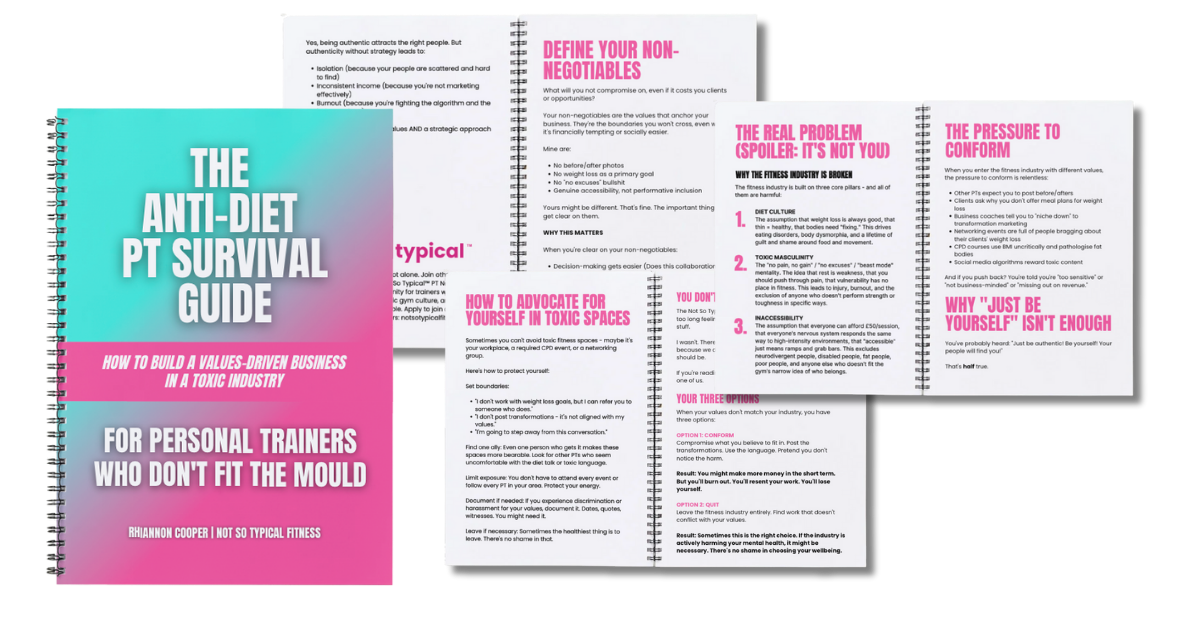When Accessibility Isn’t More Than a Buzzword
In This Article:
My Experience with OriGym
When I first signed up for a personal training course with OriGym, I felt hopeful and optimistic. As an autistic, ADHD trainee with social anxiety, I was reassured that support would be available. What followed was a masterclass in performative accessibility; where marketing promises and actual support were worlds apart.
They promised innovation, accessibility, and support.
On their site, Origym proudly states:
“We are dedicated to redefining the standard for training course providers by offering exceptional, accessible education to all aspiring fitness professionals.”
It sounds inspiring, doesn’t it?
They claim to care deeply about students; that we’re their top priority.
They say they’re here to open doors into the fitness industry.
But my experience has told a very different story.
Update: January 2026: Since publishing this review in 2024, I've heard from multiple trainee PTs who've experienced similar accessibility barriers with OriGym and other providers. The lack of neurodivergent support in PT education remains a widespread problem. I'm now a qualified personal trainer and have built the Not So Typical™ PT Network to provide the community and support that mainstream providers fail to offer.
If you're a trainee or newly qualified PT who's felt isolated, excluded, or unsupported during your qualification; you're not alone.
When "Accessible" Isn't Inclusive
As someone with autism, ADHD, and social anxiety, I often need communication to be clear, consistent, and compassionate. The one-size-fits-all approach doesn’t work for me, or for many others with additional needs.
Yet Origym’s website has no mention of EDI (Equity, Diversity, and Inclusion).
No accessibility statement. No policies or guidance for students with disabilities or mental health conditions.
There’s no sign that they understand, or even consider, the needs of neurodivergent or disabled learners. Their messaging focuses almost entirely on financial accessibility, not educational accessibility. That’s not good enough.
Silence Speaks Volumes
When I emailed Origym to express my concerns about the lack of inclusivity and to ask for support during my assessment, my message went unanswered.
Before I even enrolled, I had disclosed that I was autistic and had ADHD. I was reassured that this wouldn’t be a problem; that support would be available.
But when I actually needed that support?
Silence.
It’s disappointing, disheartening, and frankly unacceptable for a company that claims to offer “exceptional, accessible education.”
Since experiencing these barriers, I've qualified as a personal trainer, become registered with CIMSPA, and built the Not So Typical™ PT Network; a community specifically for trainers excluded by mainstream fitness education. I'm not just criticising from the outside. I'm building the alternative.
Feeling isolated in your PT journey?
You're not alone. Many trainee and newly qualified PTs face barriers that mainstream providers don't acknowledge.
The Not So Typical™ PT Network is a community for trainers who are neurodivergent, anti-diet, and feel like they don't fit the industry mould.
We offer peer support, accessible resources, and connection with PTs who actually get it.
The Gap Between Policy and Practice
Origym’s qualifications are endorsed by CIMSPA — the Chartered Institute for the Management of Sport and Physical Activity.
That endorsement should mean something.
CIMSPA’s own EDI policy highlights a strong commitment to inclusion:
“We believe in embracing difference… all applicants will be treated fairly without regard to physical or mental disability, or any other protected characteristic.”
They also state:
“No person will receive less favourable treatment or be disadvantaged by requirements or conditions which cannot be shown to be justifiable.”
If CIMSPA expects this level of inclusivity, why isn’t it being upheld by one of its endorsed providers?
It raises an important question: Who is being held accountable?
Holding CIMSPA Accountable
If you're experiencing accessibility issues with a CIMSPA-endorsed provider, you have options:
1. Document everything Keep records of all communication (or lack thereof) regarding accessibility requests, reasonable adjustments, and support needs.
2. Contact CIMSPA directly CIMSPA has a responsibility to ensure endorsed providers uphold their EDI standards. You can raise concerns via their complaints procedure.
3. Know your rights Under the Equality Act 2010, education providers must make reasonable adjustments for disabled students. Ignoring requests or failing to respond is likely a breach of legal obligations.
4. Seek support Join communities like the Not So Typical PT Network where you can connect with other trainers who've navigated these barriers and can offer practical advice.
The fitness industry will only become more inclusive when we hold education providers - and their endorsing bodies - accountable.
Missed Opportunity for Leadership
The fitness industry is crying out for greater inclusivity. Not just in gyms, but in education too. Origym had an incredible opportunity to lead by example, instead, they’ve shown how easily “accessibility” can become a buzzword rather than a value.
If you truly care about accessibility, it’s not enough to offer flexible schedules or online learning options.
Accessibility means action. It means reasonable adjustments, responsive support, and awareness of how different students experience the learning environment.
What Needs to Change
If Origym; and any other training provider; truly want to be inclusive, here’s where to start:
1.Establish a Comprehensive EDI Policy
Commit to clear, public guidelines that reflect CIMSPA’s values. Outline how you support students with disabilities, mental health needs, and neurodivergence.
2. Be Transparent About Support
Include a dedicated accessibility section on your website. Explain how to request reasonable adjustments and what students can expect in return.
3. Respond Promptly to Students
Accessibility isn’t just physical; it’s emotional too. Ignoring or delaying responses from vulnerable students sends a harmful message: that their needs don’t matter.
4. Train Your Team
Sales, tutors, and assessors should all receive training on supporting neurodivergent and disabled learners. Compassionate communication should be the standard, not the exception.
Navigating PT Qualifications as a Neurodivergent Trainee?
Get the free Anti-Diet PT Survival Guide — for trainers who don't fit the mould.
Includes:
- ✓ How to define your non-negotiables in the fitness industry
- ✓ Alternative language swap sheet (replace toxic fitness rhetoric)
- ✓ CPD vetting checklist (spot diet culture BS in courses)
- ✓ Resource list for anti-diet, neuroinclusive PTs
- ✓ How to find your people in the fitness industry
Real Accessibility Requires Action
A sleek website and smooth enrolment process can’t make up for poor accessibility behind the scenes.
True inclusion goes beyond marketing claims; it’s about accountability, transparency, and care.
The fitness industry should be a space where everyone, regardless of background, ability, or need, can thrive.
So to Origym, and to all education providers in this field:
Live your values.
Support all aspiring trainers; not just the easy ones.
Make inclusivity more than a selling point.
Because education should open doors, not create barriers. And accessibility should be the standard; not an afterthought.
The Path Forward
Education should open doors, not create barriers. Accessibility should be the standard, not an afterthought.
Since writing this post, I've built what OriGym failed to provide: a community for trainers who are neurodivergent, anti-diet, genuinely accessible, and tired of feeling like they don't belong.
The Not So Typical™ PT Network is proof that inclusive fitness education is possible — when you actually care about the people you claim to serve.
To OriGym and all education providers: live your values. Support ALL aspiring trainers. Make inclusivity more than a selling point.
And to every trainee PT who's felt excluded, ignored, or unsupported: you deserve better. You're not the problem. The system is.
Join the Not So Typical PT Network → | Download Free PT Survival Guide →
You're Not Alone: Other Students' Experiences
Since publishing this post, I've received messages from other OriGym students who've faced similar challenges:
"I'm also autistic and doing my Level 3 with OriGym. The lack of support is shocking. No one responds to my emails about reasonable adjustments." — Anonymous student, 2024
"I disclosed my ADHD during enrolment and was told it wouldn't be a problem. But when I asked for extra time on assessments, I was ignored." — Trainee PT, 2024
"Your post made me realise I'm not just 'difficult' or 'too sensitive.' The system genuinely isn't built for people like us." — Newly qualified PT, 2025
If you've experienced similar issues with OriGym or other PT education providers, you're welcome to share your story anonymously with the form below. Collective voices create change.
Building Something Better
I wrote this post because I believed OriGym could do better. The fitness industry needs education providers who genuinely understand and support all learners.
Since experiencing these barriers firsthand, I've built the Not So Typical™ PT Network — a community for trainers who are:
- Neurodivergent or struggle with typical online presence
- Anti-diet and anti-toxic gym culture
- Actively supporting marginalised communities
- Tired of feeling like the odd one out
We offer peer support, accessible resources, vetted referrals, and ongoing CPD from people who actually get it.
If this post resonated with you, you're probably one of us.
Apply to join the PT Network → | Download free PT Survival Guide →
Related Reading:
I passed my Level 2 Gym Instructing qualification with OriGym, but the process wasn’t easy. This post reflects on the barriers, accessibility challenges, and my mission to make the fitness industry more inclusive for neurodivergent people.
I’m a neurodivergent personal trainer on a mission to make fitness spaces accessible for everyone. From sensory-friendly environments to inclusive staff training, I’m working to create gyms where every body and brain can feel confident, supported, and welcome.
Gyms can feel overwhelming. With cluttered layouts, loud noises, and unwelcoming atmospheres, fitness spaces are often inaccessible for too many people. As a fat personal trainer and accessibility advocate, I’ve gone viral on TikTok and Instagram for calling out these issues, and yes, I get trolled for it.
Frequently Asked Questions (FAQs)
Is Origym an accessible personal training course provider?
While Origym advertises its courses as “accessible,” my personal experience suggests that accessibility currently refers mainly to financial flexibility rather than true inclusivity. There is limited information about disability or mental health support, and no clear accessibility or EDI (Equity, Diversity, and Inclusion) policy available on their website.
Does Origym support neurodivergent or disabled students?
At the time of writing, there are no publicly available details on how Origym supports students with autism, ADHD, anxiety, or other disabilities. This lack of transparency can make it difficult for neurodivergent or disabled students to know what reasonable adjustments or learning accommodations are available.
What should I do if I need adjustments for my personal training course?
If you’re a student with accessibility needs, it’s best to email the provider before enrolling to ask specific questions about reasonable adjustments, communication preferences, and available support. Keep written records of all correspondence in case issues arise later.
How does CIMSPA ensure inclusion in fitness education?
CIMSPA’s EDI policy emphasises that no one should be disadvantaged due to disability, neurodivergence, or mental health. They aim to create an inclusive learning environment, but this relies on training providers — like Origym — implementing those values consistently in their own courses.
What changes could make fitness education more inclusive?
To make personal training courses genuinely inclusive, providers should:
Publish a clear EDI and accessibility policy.
Offer flexible communication methods for neurodivergent learners.
Provide reasonable adjustments during assessments.
Train staff to understand and support diverse learning needs.
These steps can help ensure every aspiring trainer has an equal chance to succeed.
Why does accessibility matter in personal training qualifications?
Fitness professionals often go on to work with clients who have a wide range of needs — physical, mental, and sensory. If education providers fail to model accessibility, the entire industry risks excluding both trainers and clients who need extra understanding and adaptation.




